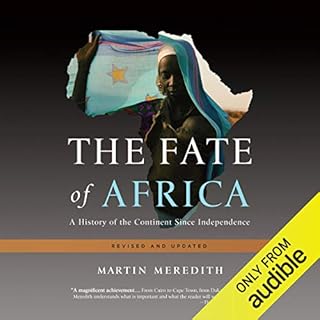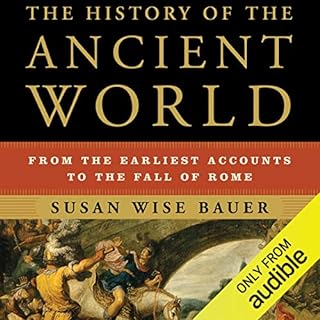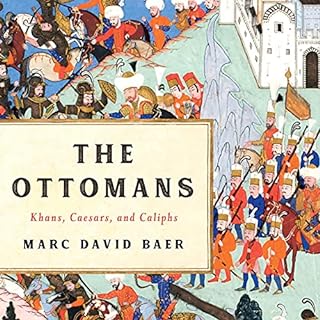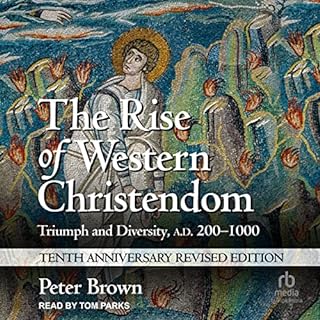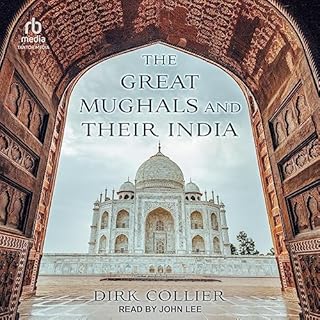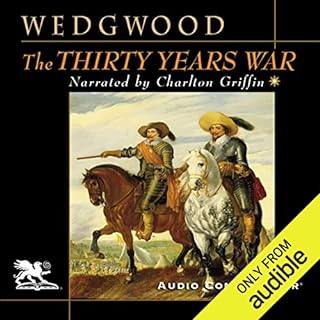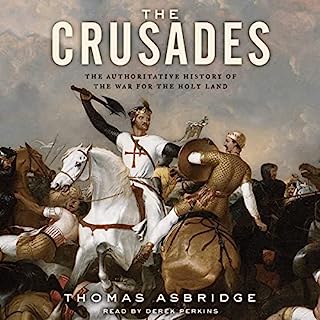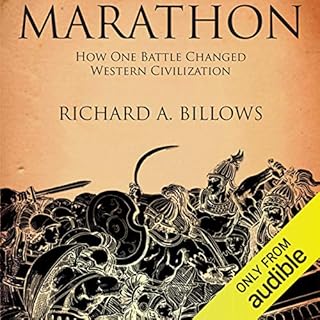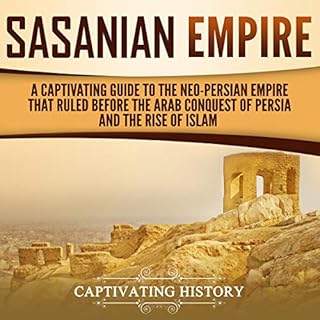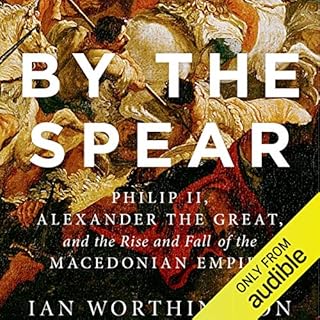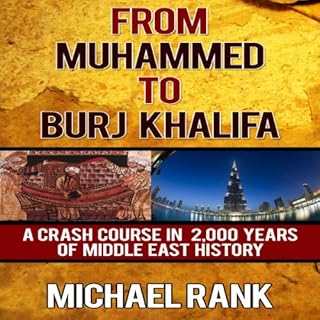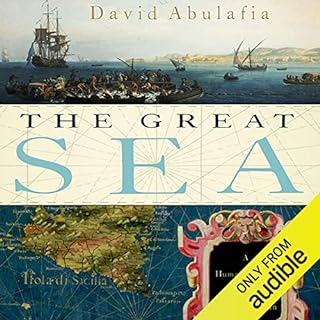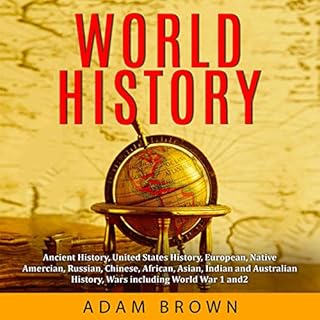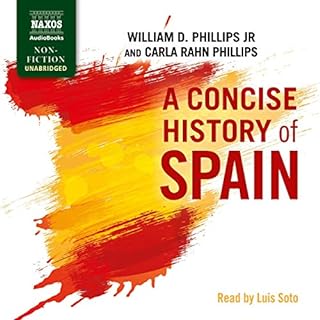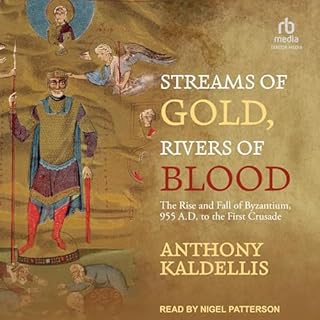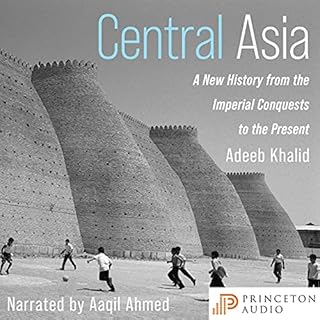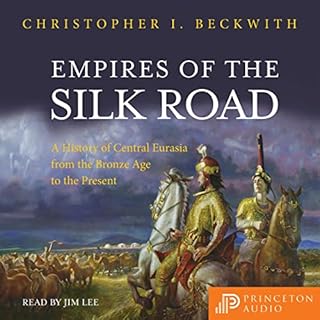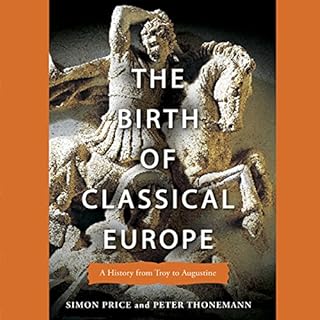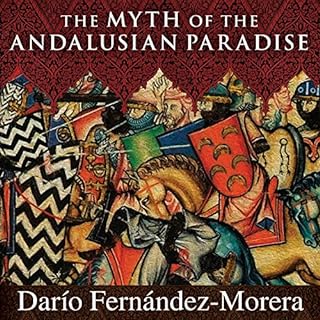
In God's Path
The Arab Conquests and the Creation of an Islamic Empire
Failed to add items
Add to Cart failed.
Add to Wish List failed.
Remove from wishlist failed.
Adding to library failed
Follow podcast failed
Unfollow podcast failed
$0.99/mo first 3 months
 Prime members: New to Audible?
Prime members: New to Audible?Get 2 free audiobooks during trial.
Buy for $24.95
No default payment method selected.
We are sorry. We are not allowed to sell this product with the selected payment method
-
Narrated by:
-
Peter Ganim
About this listen
In just over a hundred years - from the death of Muhammad in 632 to the beginning of the Abbasid Caliphate in 750 - the followers of the Prophet swept across the whole of the Middle East, North Africa, and Spain. Their armies threatened states as far flung as the Franks in Western Europe and the Tang Empire in China. The conquered territory was larger than the Roman Empire at its greatest expansion, and it was claimed for the Arabs in roughly half the time. How this collection of Arabian tribes was able to engulf so many empires, states, and armies in such a short period has perplexed historians for centuries. Most accounts of the Arab invasions have been based almost solely on the early Muslim sources, which were composed centuries later to illustrate the divinely chosen status of the Arabs. Robert Hoyland's groundbreaking new history assimilates not only the rich biographical information of the early Muslim sources but also the many non-Arabic sources, contemporaneous or near-contemporaneous with the conquests.
In God's Path begins with a broad picture of the Late Antique world prior to the Prophet's arrival, a world dominated by two superpowers: Byzantium and Sasanian Persia. In between these empires, emerged a distinct Arabian identity, which helped forge the inhabitants of western Arabia into a formidable fighting force. The Arabs are the principal actors in this drama yet, as Hoyland shows, the peoples along the edges of Byzantium and Persia - the Khazars, Bulgars, Avars, and Turks - all played critical roles in the remaking of the old world order. The new faith propagated by Muhammad and his successors made it possible for many of the conquered peoples to join the Arabs in creating the first Islamic Empire.
Well-paced, comprehensive, and eminently readable, In God's Path presents a sweeping narrative of a transformational period in world history.
Download the accompanying reference guide.©2015 Oxford University Press (P)2014 Audible Inc.Listeners also enjoyed...
-
The Fate of Africa
- A History of the Continent Since Independence
- By: Martin Meredith
- Narrated by: Fleet Cooper
- Length: 29 hrs and 22 mins
- Unabridged
-
Overall4.5 out of 5 stars 387
-
Performance4.5 out of 5 stars 337
-
Story4.5 out of 5 stars 333
Martin Meredith has revised this classic history to incorporate important recent developments, including the Darfur crisis in Sudan, Robert Mugabe’s continued destructive rule in Zimbabwe, controversies over Western aid and exploitation of Africa’s resources, the growing importance and influence of China, and the democratic movement roiling the North African countries of Tunisia, Egypt, and Jordan.
-
4 out of 5 stars
-
Africa: Land of Hope and Horror
- By Jeff on 03-08-14
By: Martin Meredith
-
The History of the Ancient World
- From the Earliest Accounts to the Fall of Rome
- By: Susan Wise Bauer
- Narrated by: John Lee
- Length: 26 hrs and 20 mins
- Unabridged
-
Overall4.5 out of 5 stars 5,608
-
Performance4.5 out of 5 stars 4,903
-
Story4.5 out of 5 stars 4,876
This is the first volume in a bold new series that tells the stories of all peoples, connecting historical events from Europe to the Middle East to the far coast of China, while still giving weight to the characteristics of each country. Susan Wise Bauer provides both sweeping scope and vivid attention to the individual lives that give flesh to abstract assertions about human history. This narrative history employs the methods of "history from beneath" - literature, epic traditions, private letters, and accounts - to connect kings and leaders with the lives of those they ruled.
-
5 out of 5 stars
-
An Historic Achievement
- By Ellen S. Wilds on 04-25-14
By: Susan Wise Bauer
-
The Ottomans
- Khans, Caesars, and Caliphs
- By: Marc David Baer
- Narrated by: Jamie Parker
- Length: 17 hrs and 31 mins
- Unabridged
-
Overall4.5 out of 5 stars 178
-
Performance4.5 out of 5 stars 150
-
Story4.5 out of 5 stars 149
The Ottoman Empire has long been depicted as the Islamic Asian antithesis of the Christian European West. But the reality was starkly different: the Ottomans’ multiethnic, multilingual, and multireligious domain reached deep into Europe’s heart. Indeed, the Ottoman rulers saw themselves as the new Romans. Recounting the Ottomans’ remarkable rise from a frontier principality to a world empire, historian Marc David Baer traces their debts to their Turkish, Mongolian, Islamic, and Byzantine heritage.
-
4 out of 5 stars
-
Great except for pronunt of Turkish names
- By Anonymous User on 11-04-22
By: Marc David Baer
-
Arabs
- A 3,000-Year History of Peoples, Tribes, and Empires
- By: Tim Mackintosh-Smith
- Narrated by: Ralph Lister
- Length: 25 hrs and 34 mins
- Unabridged
-
Overall4.5 out of 5 stars 290
-
Performance4.5 out of 5 stars 255
-
Story4.5 out of 5 stars 255
This kaleidoscopic book covers almost 3,000 years of Arab history and shines a light on the footloose Arab peoples and tribes who conquered lands and disseminated their language and culture over vast distances. Tracing this process to the origins of the Arabic language, rather than the advent of Islam, Tim Mackintosh-Smith begins his narrative more than a thousand years before Muhammad and focuses on how Arabic, both spoken and written, has functioned as a vital source of shared cultural identity over the millennia.
-
5 out of 5 stars
-
Good book bad narration
- By Anonymous User on 09-18-19
-
Lost Enlightenment
- Central Asia's Golden Age from the Arab Conquest to Tamerlane
- By: S. Frederick Starr
- Narrated by: Kevin Stillwell
- Length: 25 hrs and 16 mins
- Unabridged
-
Overall4.5 out of 5 stars 504
-
Performance4.5 out of 5 stars 434
-
Story4.5 out of 5 stars 432
Lost Enlightenment recounts how, between the years 800 and 1200, Central Asia led the world in trade and economic development, the size and sophistication of its cities, the refinement of its arts, and, above all, in the advancement of knowledge in many fields. Central Asians achieved signal breakthroughs in astronomy, mathematics, geology, medicine, chemistry, music, social science, philosophy, and theology, among other subjects.
-
2 out of 5 stars
-
Subject worthwhile but repetative narrative
- By F-M on 04-10-14
-
The Rise of Western Christendom (10th Anniversary Revised Edition)
- Triumph and Diversity, A.D. 200-1000
- By: Peter Brown
- Narrated by: Tom Parks
- Length: 26 hrs and 48 mins
- Unabridged
-
Overall4.5 out of 5 stars 25
-
Performance4.5 out of 5 stars 21
-
Story4.5 out of 5 stars 21
This tenth anniversary revised edition of the authoritative text on Christianity's first thousand years of history features a new preface and an updated bibliography. The essential general survey of medieval European Christendom, Brown's vivid prose charts the compelling and tumultuous rise of an institution that came to wield enormous religious and secular power.
-
5 out of 5 stars
-
Must read for Western & Church history
- By ReviewAmazon384 on 12-08-23
By: Peter Brown
-
The Fate of Africa
- A History of the Continent Since Independence
- By: Martin Meredith
- Narrated by: Fleet Cooper
- Length: 29 hrs and 22 mins
- Unabridged
-
Overall4.5 out of 5 stars 387
-
Performance4.5 out of 5 stars 337
-
Story4.5 out of 5 stars 333
Martin Meredith has revised this classic history to incorporate important recent developments, including the Darfur crisis in Sudan, Robert Mugabe’s continued destructive rule in Zimbabwe, controversies over Western aid and exploitation of Africa’s resources, the growing importance and influence of China, and the democratic movement roiling the North African countries of Tunisia, Egypt, and Jordan.
-
4 out of 5 stars
-
Africa: Land of Hope and Horror
- By Jeff on 03-08-14
By: Martin Meredith
-
The History of the Ancient World
- From the Earliest Accounts to the Fall of Rome
- By: Susan Wise Bauer
- Narrated by: John Lee
- Length: 26 hrs and 20 mins
- Unabridged
-
Overall4.5 out of 5 stars 5,608
-
Performance4.5 out of 5 stars 4,903
-
Story4.5 out of 5 stars 4,876
This is the first volume in a bold new series that tells the stories of all peoples, connecting historical events from Europe to the Middle East to the far coast of China, while still giving weight to the characteristics of each country. Susan Wise Bauer provides both sweeping scope and vivid attention to the individual lives that give flesh to abstract assertions about human history. This narrative history employs the methods of "history from beneath" - literature, epic traditions, private letters, and accounts - to connect kings and leaders with the lives of those they ruled.
-
5 out of 5 stars
-
An Historic Achievement
- By Ellen S. Wilds on 04-25-14
By: Susan Wise Bauer
-
The Ottomans
- Khans, Caesars, and Caliphs
- By: Marc David Baer
- Narrated by: Jamie Parker
- Length: 17 hrs and 31 mins
- Unabridged
-
Overall4.5 out of 5 stars 178
-
Performance4.5 out of 5 stars 150
-
Story4.5 out of 5 stars 149
The Ottoman Empire has long been depicted as the Islamic Asian antithesis of the Christian European West. But the reality was starkly different: the Ottomans’ multiethnic, multilingual, and multireligious domain reached deep into Europe’s heart. Indeed, the Ottoman rulers saw themselves as the new Romans. Recounting the Ottomans’ remarkable rise from a frontier principality to a world empire, historian Marc David Baer traces their debts to their Turkish, Mongolian, Islamic, and Byzantine heritage.
-
4 out of 5 stars
-
Great except for pronunt of Turkish names
- By Anonymous User on 11-04-22
By: Marc David Baer
-
Arabs
- A 3,000-Year History of Peoples, Tribes, and Empires
- By: Tim Mackintosh-Smith
- Narrated by: Ralph Lister
- Length: 25 hrs and 34 mins
- Unabridged
-
Overall4.5 out of 5 stars 290
-
Performance4.5 out of 5 stars 255
-
Story4.5 out of 5 stars 255
This kaleidoscopic book covers almost 3,000 years of Arab history and shines a light on the footloose Arab peoples and tribes who conquered lands and disseminated their language and culture over vast distances. Tracing this process to the origins of the Arabic language, rather than the advent of Islam, Tim Mackintosh-Smith begins his narrative more than a thousand years before Muhammad and focuses on how Arabic, both spoken and written, has functioned as a vital source of shared cultural identity over the millennia.
-
5 out of 5 stars
-
Good book bad narration
- By Anonymous User on 09-18-19
-
Lost Enlightenment
- Central Asia's Golden Age from the Arab Conquest to Tamerlane
- By: S. Frederick Starr
- Narrated by: Kevin Stillwell
- Length: 25 hrs and 16 mins
- Unabridged
-
Overall4.5 out of 5 stars 504
-
Performance4.5 out of 5 stars 434
-
Story4.5 out of 5 stars 432
Lost Enlightenment recounts how, between the years 800 and 1200, Central Asia led the world in trade and economic development, the size and sophistication of its cities, the refinement of its arts, and, above all, in the advancement of knowledge in many fields. Central Asians achieved signal breakthroughs in astronomy, mathematics, geology, medicine, chemistry, music, social science, philosophy, and theology, among other subjects.
-
2 out of 5 stars
-
Subject worthwhile but repetative narrative
- By F-M on 04-10-14
-
The Rise of Western Christendom (10th Anniversary Revised Edition)
- Triumph and Diversity, A.D. 200-1000
- By: Peter Brown
- Narrated by: Tom Parks
- Length: 26 hrs and 48 mins
- Unabridged
-
Overall4.5 out of 5 stars 25
-
Performance4.5 out of 5 stars 21
-
Story4.5 out of 5 stars 21
This tenth anniversary revised edition of the authoritative text on Christianity's first thousand years of history features a new preface and an updated bibliography. The essential general survey of medieval European Christendom, Brown's vivid prose charts the compelling and tumultuous rise of an institution that came to wield enormous religious and secular power.
-
5 out of 5 stars
-
Must read for Western & Church history
- By ReviewAmazon384 on 12-08-23
By: Peter Brown
-
Weavers, Scribes, and Kings
- A New History of the Ancient Near East
- By: Amanda H. Podany
- Narrated by: Amanda H. Podany
- Length: 18 hrs and 26 mins
- Unabridged
-
Overall5 out of 5 stars 166
-
Performance5 out of 5 stars 149
-
Story5 out of 5 stars 149
In this sweeping history of the ancient Near East, Amanda Podany takes listeners on a gripping journey from the creation of the world's first cities to the conquests of Alexander the Great. The book is built around the life stories of many ancient men and women, from kings, priestesses, and merchants to brickmakers, musicians, and weavers. Their habits of daily life, beliefs, triumphs, and crises, and the changes that people faced over time are explored through their own written words and the buildings, cities, and empires in which they lived.
-
3 out of 5 stars
-
word of advice
- By Jim Davis on 08-04-23
By: Amanda H. Podany
-
Assyria
- The Rise and Fall of the World's First Empire
- By: Eckart Frahm
- Narrated by: Matthew Lloyd Davies
- Length: 15 hrs and 4 mins
- Unabridged
-
Overall4.5 out of 5 stars 104
-
Performance4.5 out of 5 stars 92
-
Story4.5 out of 5 stars 91
At its height in 660 BCE, the kingdom of Assyria stretched from the Mediterranean Sea to the Persian Gulf. It was the first empire the world had ever seen. Here, historian Eckart Frahm tells the epic story of Assyria and its formative role in global history. Assyria’s wide-ranging conquests have long been known from the Hebrew Bible and later Greek accounts. But nearly two centuries of research now permit a rich picture of the Assyrians and their empire beyond the battlefield.
-
5 out of 5 stars
-
Outstanding Historical Book
- By Okahead on 05-15-23
By: Eckart Frahm
-
God's Shadow
- Sultan Selim, His Ottoman Empire, and the Making of the Modern World
- By: Alan Mikhail
- Narrated by: James Cameron Stewart
- Length: 16 hrs and 11 mins
- Unabridged
-
Overall4.5 out of 5 stars 232
-
Performance4.5 out of 5 stars 196
-
Story4.5 out of 5 stars 194
Long neglected in world history, the Ottoman Empire was a hub of intellectual fervor, geopolitical power, and enlightened pluralistic rule. Yet, despite its towering influence and centrality to the rise of our modern world, the Ottoman Empire's history has for centuries been distorted, misrepresented, and even suppressed in the West. Now Alan Mikhail presents a vitally needed recasting of Ottoman history, retelling the story of the Ottoman conquest of the world through the dramatic biography of Sultan Selim I (1470-1520).
-
1 out of 5 stars
-
Entertaining narrative, but poor scholarship
- By Yosemite on 09-15-20
By: Alan Mikhail
-
Byzantium
- The Surprising Life of a Medieval Empire
- By: Judith Herrin
- Narrated by: Phyllida Nash
- Length: 16 hrs and 14 mins
- Unabridged
-
Overall4.5 out of 5 stars 25
-
Performance4.5 out of 5 stars 19
-
Story4.5 out of 5 stars 19
Byzantium. The name evokes grandeur and exoticism—gold, cunning, and complexity. In this unique book, Judith Herrin unveils the riches of a quite different civilization. Avoiding a standard chronological account of the Byzantine Empire's millennium-long history, she identifies the fundamental questions about Byzantium—what it was, and what special significance it holds for us today.
-
2 out of 5 stars
-
Not a comprehensible history
- By kevin arsenault on 10-07-23
By: Judith Herrin
-
After the Prophet
- The Epic Story of the Shia-Sunni Split in Islam
- By: Lesley Hazleton
- Narrated by: Lesley Hazleton
- Length: 7 hrs and 33 mins
- Unabridged
-
Overall4.5 out of 5 stars 1,051
-
Performance4.5 out of 5 stars 953
-
Story4.5 out of 5 stars 947
Combining meticulous research with compelling storytelling, After the Prophet explores the volatile intersections of religion and politics, psychology and culture, and history and current events. It is an indispensable guide to the depth and power of the Shia-Sunni split.
-
2 out of 5 stars
-
A good novel - but poor history
- By Yosemite on 03-08-19
By: Lesley Hazleton
-
The Great Mughals and Their India
- By: Dirk Collier
- Narrated by: John Lee
- Length: 14 hrs and 18 mins
- Unabridged
-
Overall4.5 out of 5 stars 8
-
Performance5 out of 5 stars 5
-
Story5 out of 5 stars 5
A definitive, comprehensive and engrossing chronicle of one of the greatest dynasties of the world—the Mughal—from its founder Babur to Bahadur Shah Zafar, the last of the clan the magnificent Mughal legacy is an inexhaustible source of inspiration to historians, writers, moviemakers, artists and ordinary mortals alike. Here is a fascinating and riveting saga that brings alive a spectacular bygone era—authentically and convincingly.
By: Dirk Collier
-
Carthage Must Be Destroyed
- The Rise and Fall of an Ancient Civilization
- By: Richard Miles
- Narrated by: Grover Gardner
- Length: 14 hrs and 9 mins
- Unabridged
-
Overall4.5 out of 5 stars 679
-
Performance4.5 out of 5 stars 588
-
Story4.5 out of 5 stars 585
An epic history of a doomed civilization and a lost empire. The devastating struggle to the death between the Carthaginians and the Romans was one of the defining dramas of the ancient world. In an epic series of land and sea battles, both sides came close to victory before the Carthaginians finally succumbed and their capital city, history, and culture were almost utterly erased.
-
5 out of 5 stars
-
Outstanding! This is THE book on Carthage.
- By Haakon B. Dahl on 01-21-13
By: Richard Miles
-
The Thirty Years War
- By: C. V. Wedgwood
- Narrated by: Charlton Griffin
- Length: 19 hrs and 45 mins
- Unabridged
-
Overall4.5 out of 5 stars 855
-
Performance4.5 out of 5 stars 747
-
Story4.5 out of 5 stars 743
Initially, the Thirty Years War was precipitated in 1618 by religious conflicts between Protestants and Catholics in the Holy Roman Empire. But the conflict soon spread beyond religion to encompass the internal politics and balance of power within the Empire, and then later to the other European powers. By the end, it became simply a dynastic struggle between Bourbon France and Habsburg Spain. And almost all of it was fought out in Germany. Entire regions were depopulated and destroyed.
-
5 out of 5 stars
-
One of the World's Great History Books.
- By Judith A. Weller on 08-25-12
By: C. V. Wedgwood
-
The Fall of the Roman Empire
- A New History of Rome and the Barbarians
- By: Peter Heather
- Narrated by: Allan Robertson
- Length: 21 hrs and 43 mins
- Unabridged
-
Overall4 out of 5 stars 486
-
Performance4.5 out of 5 stars 435
-
Story4.5 out of 5 stars 433
The death of the Roman Empire is one of the perennial mysteries of world history. Now, in this groundbreaking book, Peter Heather proposes a stunning new solution: Centuries of imperialism turned the neighbors Rome called barbarians into an enemy capable of dismantling an Empire that had dominated their lives for so long. A leading authority on the late Roman Empire and on the barbarians, Heather relates the extraordinary story of how Europe's barbarians, transformed by centuries of contact with Rome on every possible level, eventually pulled the empire apart.
-
1 out of 5 stars
-
A New HIstory but not a better history
- By Mario on 03-28-14
By: Peter Heather
-
Empires of the Steppes
- By: Kenneth Harl
- Narrated by: Corey M. Snow
- Length: 17 hrs and 13 mins
- Unabridged
-
Overall4.5 out of 5 stars 130
-
Performance4.5 out of 5 stars 112
-
Story4.5 out of 5 stars 112
The barbarian nomads of the Eurasian steppes have played a decisive role in world history, but their achievements have gone largely unnoticed. These nomadic tribes have produced some of the world’s greatest conquerors: Attila the Hun, Genghis Khan and Tamerlane, among others. Their deeds still resonate today. Indeed, these nomads built long-lasting empires, facilitated the first global trade of the Silk Road and disseminated religions, technology, knowledge and goods of every description that enriched and changed the lives of so many across Europe, China and the Middle East.
-
5 out of 5 stars
-
Interview with Dan Carlin
- By Laurie A. Steuart on 08-17-23
By: Kenneth Harl
-
Ibn Khaldun
- An Intellectual Biography
- By: Robert Irwin
- Narrated by: John Telfer
- Length: 9 hrs and 34 mins
- Unabridged
-
Overall4 out of 5 stars 86
-
Performance4.5 out of 5 stars 73
-
Story4 out of 5 stars 72
Ibn Khaldun (1332-1406) is generally regarded as the greatest intellectual ever to have appeared in the Arab world - a genius who ranks as one of the world's great minds. Yet the author of the Muqaddima, the most important study of history ever produced in the Islamic world, is not as well known as he should be, and his ideas are widely misunderstood. In this groundbreaking intellectual biography, Robert Irwin provides an engaging and authoritative account of Ibn Khaldun's extraordinary life, times, writings, and ideas.
-
2 out of 5 stars
-
Issues with accuracy, pronounciation
- By Moh 3aly on 01-02-19
By: Robert Irwin
-
The Crusades
- The Authoritative History of the War for the Holy Land
- By: Thomas Asbridge
- Narrated by: Derek Perkins
- Length: 25 hrs and 32 mins
- Unabridged
-
Overall4.5 out of 5 stars 3,985
-
Performance4.5 out of 5 stars 3,539
-
Story4.5 out of 5 stars 3,517
The Crusades is an authoritative, accessible single-volume history of the brutal struggle for the Holy Land in the Middle Ages. Thomas Asbridge - a renowned historian who writes with "maximum vividness" (Joan Acocella, The New Yorker) - covers the years 1095 to 1291 in this big, ambitious, listenable account of one of the most fascinating periods in history.
-
4 out of 5 stars
-
Comprehensive
- By Tad Davis on 10-04-16
By: Thomas Asbridge
Related to this topic
-
The Fall of the Roman Empire
- A New History of Rome and the Barbarians
- By: Peter Heather
- Narrated by: Allan Robertson
- Length: 21 hrs and 43 mins
- Unabridged
-
Overall4 out of 5 stars 486
-
Performance4.5 out of 5 stars 435
-
Story4.5 out of 5 stars 433
The death of the Roman Empire is one of the perennial mysteries of world history. Now, in this groundbreaking book, Peter Heather proposes a stunning new solution: Centuries of imperialism turned the neighbors Rome called barbarians into an enemy capable of dismantling an Empire that had dominated their lives for so long. A leading authority on the late Roman Empire and on the barbarians, Heather relates the extraordinary story of how Europe's barbarians, transformed by centuries of contact with Rome on every possible level, eventually pulled the empire apart.
-
1 out of 5 stars
-
A New HIstory but not a better history
- By Mario on 03-28-14
By: Peter Heather
-
Carthage Must Be Destroyed
- The Rise and Fall of an Ancient Civilization
- By: Richard Miles
- Narrated by: Grover Gardner
- Length: 14 hrs and 9 mins
- Unabridged
-
Overall4.5 out of 5 stars 679
-
Performance4.5 out of 5 stars 588
-
Story4.5 out of 5 stars 585
An epic history of a doomed civilization and a lost empire. The devastating struggle to the death between the Carthaginians and the Romans was one of the defining dramas of the ancient world. In an epic series of land and sea battles, both sides came close to victory before the Carthaginians finally succumbed and their capital city, history, and culture were almost utterly erased.
-
5 out of 5 stars
-
Outstanding! This is THE book on Carthage.
- By Haakon B. Dahl on 01-21-13
By: Richard Miles
-
Marathon
- The Battle That Changed Western Civilization
- By: Richard A. Billows
- Narrated by: Jeremy Gage
- Length: 8 hrs and 59 mins
- Unabridged
-
Overall4.5 out of 5 stars 114
-
Performance4.5 out of 5 stars 92
-
Story4.5 out of 5 stars 90
Published to coincide with Marathon's 2500th anniversary, a riveting history of the historic battle. The Battle of Marathon in 490 B.C. is not only understood as the most decisive event in the struggle between the Greeks and the Persians, but can also be seen as perhaps the most significant moment in our collective history. 10,000 Athenian citizens faced a Persian military force of more than 25,000.
-
5 out of 5 stars
-
Effectively evokes the world of ancient greece
- By Aaron on 11-02-10
-
Sasanian Empire
- A Captivating Guide to the Neo-Persian Empire That Ruled Before the Arab Conquest of Persia and the Rise of Islam
- By: Captivating History
- Narrated by: Desmond Manny
- Length: 1 hr and 42 mins
- Unabridged
-
Overall4.5 out of 5 stars 36
-
Performance4.5 out of 5 stars 33
-
Story4.5 out of 5 stars 33
In this Captivating History audiobook, you will discover how important the Sasanian Empire was to history and how their legacy became an integral part of what we today think of as Islamic culture.
-
5 out of 5 stars
-
A Useful Survey of an Important Empire.
- By Michael C. Walker on 12-22-18
-
Parthian Empire
- A Captivating Guide to the Enemy of the Roman Republic and Roman Empire
- By: Captivating History
- Narrated by: David Patton
- Length: 1 hr and 45 mins
- Unabridged
-
Overall4.5 out of 5 stars 24
-
Performance4.5 out of 5 stars 21
-
Story4.5 out of 5 stars 21
Explore the most enduring empire of the ancient Near East. Few nations were able to not only parry but also defeat the mighty Roman Empire, rivaling it in almost all segments. One of those was the Parthian empire, cultural and traditional successor of the more famous Achaemenid Persian empire that was brought down by the Alexander the Great.
-
5 out of 5 stars
-
Too short!
- By Viktor V. Choban on 12-03-21
-
By the Spear
- Philip II, Alexander the Great, and the Rise and Fall of the Macedonian Empire
- By: Ian Worthington
- Narrated by: Phil Holland
- Length: 11 hrs and 14 mins
- Unabridged
-
Overall4.5 out of 5 stars 147
-
Performance3.5 out of 5 stars 129
-
Story4.5 out of 5 stars 130
For the first time, By the Spear offers an exhilarating military narrative of the reigns of these two larger-than-life figures in one volume. Ian Worthington gives full breadth to the careers of father and son, showing how Philip was the architect of the Macedonian empire, which reached its zenith under Alexander, only to disintegrate upon his death.
-
2 out of 5 stars
-
Bueller..... Bueller...... Bueller...... Monotone
- By Jonathan Allen Beard on 02-15-15
By: Ian Worthington
-
The Fall of the Roman Empire
- A New History of Rome and the Barbarians
- By: Peter Heather
- Narrated by: Allan Robertson
- Length: 21 hrs and 43 mins
- Unabridged
-
Overall4 out of 5 stars 486
-
Performance4.5 out of 5 stars 435
-
Story4.5 out of 5 stars 433
The death of the Roman Empire is one of the perennial mysteries of world history. Now, in this groundbreaking book, Peter Heather proposes a stunning new solution: Centuries of imperialism turned the neighbors Rome called barbarians into an enemy capable of dismantling an Empire that had dominated their lives for so long. A leading authority on the late Roman Empire and on the barbarians, Heather relates the extraordinary story of how Europe's barbarians, transformed by centuries of contact with Rome on every possible level, eventually pulled the empire apart.
-
1 out of 5 stars
-
A New HIstory but not a better history
- By Mario on 03-28-14
By: Peter Heather
-
Carthage Must Be Destroyed
- The Rise and Fall of an Ancient Civilization
- By: Richard Miles
- Narrated by: Grover Gardner
- Length: 14 hrs and 9 mins
- Unabridged
-
Overall4.5 out of 5 stars 679
-
Performance4.5 out of 5 stars 588
-
Story4.5 out of 5 stars 585
An epic history of a doomed civilization and a lost empire. The devastating struggle to the death between the Carthaginians and the Romans was one of the defining dramas of the ancient world. In an epic series of land and sea battles, both sides came close to victory before the Carthaginians finally succumbed and their capital city, history, and culture were almost utterly erased.
-
5 out of 5 stars
-
Outstanding! This is THE book on Carthage.
- By Haakon B. Dahl on 01-21-13
By: Richard Miles
-
Marathon
- The Battle That Changed Western Civilization
- By: Richard A. Billows
- Narrated by: Jeremy Gage
- Length: 8 hrs and 59 mins
- Unabridged
-
Overall4.5 out of 5 stars 114
-
Performance4.5 out of 5 stars 92
-
Story4.5 out of 5 stars 90
Published to coincide with Marathon's 2500th anniversary, a riveting history of the historic battle. The Battle of Marathon in 490 B.C. is not only understood as the most decisive event in the struggle between the Greeks and the Persians, but can also be seen as perhaps the most significant moment in our collective history. 10,000 Athenian citizens faced a Persian military force of more than 25,000.
-
5 out of 5 stars
-
Effectively evokes the world of ancient greece
- By Aaron on 11-02-10
-
Sasanian Empire
- A Captivating Guide to the Neo-Persian Empire That Ruled Before the Arab Conquest of Persia and the Rise of Islam
- By: Captivating History
- Narrated by: Desmond Manny
- Length: 1 hr and 42 mins
- Unabridged
-
Overall4.5 out of 5 stars 36
-
Performance4.5 out of 5 stars 33
-
Story4.5 out of 5 stars 33
In this Captivating History audiobook, you will discover how important the Sasanian Empire was to history and how their legacy became an integral part of what we today think of as Islamic culture.
-
5 out of 5 stars
-
A Useful Survey of an Important Empire.
- By Michael C. Walker on 12-22-18
-
Parthian Empire
- A Captivating Guide to the Enemy of the Roman Republic and Roman Empire
- By: Captivating History
- Narrated by: David Patton
- Length: 1 hr and 45 mins
- Unabridged
-
Overall4.5 out of 5 stars 24
-
Performance4.5 out of 5 stars 21
-
Story4.5 out of 5 stars 21
Explore the most enduring empire of the ancient Near East. Few nations were able to not only parry but also defeat the mighty Roman Empire, rivaling it in almost all segments. One of those was the Parthian empire, cultural and traditional successor of the more famous Achaemenid Persian empire that was brought down by the Alexander the Great.
-
5 out of 5 stars
-
Too short!
- By Viktor V. Choban on 12-03-21
-
By the Spear
- Philip II, Alexander the Great, and the Rise and Fall of the Macedonian Empire
- By: Ian Worthington
- Narrated by: Phil Holland
- Length: 11 hrs and 14 mins
- Unabridged
-
Overall4.5 out of 5 stars 147
-
Performance3.5 out of 5 stars 129
-
Story4.5 out of 5 stars 130
For the first time, By the Spear offers an exhilarating military narrative of the reigns of these two larger-than-life figures in one volume. Ian Worthington gives full breadth to the careers of father and son, showing how Philip was the architect of the Macedonian empire, which reached its zenith under Alexander, only to disintegrate upon his death.
-
2 out of 5 stars
-
Bueller..... Bueller...... Bueller...... Monotone
- By Jonathan Allen Beard on 02-15-15
By: Ian Worthington
-
The History of the Ancient World
- From the Earliest Accounts to the Fall of Rome
- By: Susan Wise Bauer
- Narrated by: John Lee
- Length: 26 hrs and 20 mins
- Unabridged
-
Overall4.5 out of 5 stars 5,608
-
Performance4.5 out of 5 stars 4,903
-
Story4.5 out of 5 stars 4,876
This is the first volume in a bold new series that tells the stories of all peoples, connecting historical events from Europe to the Middle East to the far coast of China, while still giving weight to the characteristics of each country. Susan Wise Bauer provides both sweeping scope and vivid attention to the individual lives that give flesh to abstract assertions about human history. This narrative history employs the methods of "history from beneath" - literature, epic traditions, private letters, and accounts - to connect kings and leaders with the lives of those they ruled.
-
5 out of 5 stars
-
An Historic Achievement
- By Ellen S. Wilds on 04-25-14
By: Susan Wise Bauer
-
From Muhammed to Burj Khalifa
- A Crash Course in 2,000 Years of Middle East History
- By: Michael Rank
- Narrated by: Kevin Pierce
- Length: 2 hrs and 2 mins
- Unabridged
-
Overall4 out of 5 stars 102
-
Performance4 out of 5 stars 84
-
Story4 out of 5 stars 85
To untangle the modern Middle East conflict and the 2,000 years behind it, this book is divided into 25 concise chapters. Each one is devoted to a major theme in Middle East history, such as the beginning of Islam, the Crusades, Genghis Khan, and the beginning of Israel in 1948. They can be read in a few minutes, giving you a fast overview of the issues and help you to understand Middle East current events.
-
4 out of 5 stars
-
Interesting, but of course it's quite brief
- By Philo on 07-26-13
By: Michael Rank
-
Ragnar Lothbrok and a History of the Vikings
- Viking Warriors Including Rollo, Norsemen, Norse Mythology, Quests in America, England, France, Scotland, Ireland and Russia
- By: Noah Brown
- Narrated by: Dalan E. Decker
- Length: 8 hrs and 9 mins
- Unabridged
-
Overall4 out of 5 stars 245
-
Performance4 out of 5 stars 227
-
Story4 out of 5 stars 224
Ragnar Lothbrok was a legendary warrior who left a legacy among the Vikings like none other. Today's popular TV show may have popularized Ragnar's story, but the real facts are not very well known. Discover the truth behind this Viking warrior and the rich history of the Vikings.
-
5 out of 5 stars
-
Happy with this purchase!
- By Michelle Watson on 09-08-19
By: Noah Brown
-
The Great Sea
- A Human History of the Mediterranean
- By: David Abulafia
- Narrated by: Jason Culp
- Length: 29 hrs and 25 mins
- Unabridged
-
Overall4.5 out of 5 stars 252
-
Performance4.5 out of 5 stars 199
-
Story4 out of 5 stars 199
Ranging from prehistory to the 21st century, The Great Sea is above all the history of human interaction across a region that has brought together many of the great civilizations of antiquity as well as the rival empires of medieval and modern times.
-
4 out of 5 stars
-
American Narration at it's Most Disapointing
- By Anonymous User on 03-26-18
By: David Abulafia
-
The Crusades
- The Authoritative History of the War for the Holy Land
- By: Thomas Asbridge
- Narrated by: Derek Perkins
- Length: 25 hrs and 32 mins
- Unabridged
-
Overall4.5 out of 5 stars 3,985
-
Performance4.5 out of 5 stars 3,539
-
Story4.5 out of 5 stars 3,517
The Crusades is an authoritative, accessible single-volume history of the brutal struggle for the Holy Land in the Middle Ages. Thomas Asbridge - a renowned historian who writes with "maximum vividness" (Joan Acocella, The New Yorker) - covers the years 1095 to 1291 in this big, ambitious, listenable account of one of the most fascinating periods in history.
-
4 out of 5 stars
-
Comprehensive
- By Tad Davis on 10-04-16
By: Thomas Asbridge
-
World History
- Ancient History, United States History, European, Native American, Russian, Chinese, Asian, Indian and Australian History, Wars Including World War 1 and 2
- By: Adam Brown
- Narrated by: Sarah Moore
- Length: 5 hrs and 9 mins
- Unabridged
-
Overall4 out of 5 stars 90
-
Performance4.5 out of 5 stars 79
-
Story4.5 out of 5 stars 79
Have you ever wondered how the world got to where it is today? Get ready to discover the rich history of our planet. You will be astonished to learn about some of the events that have occurred! Subjects include: Ancient Greece, Ancient Egypt, The Roman Empire, Constantine and Christianity, India, Ancient Korea, Chinese Dynasties, Napoleonic Europe, Foundation of USA, The 1812 War, Australia and Wars, World War I, World War II, The Ottoman Empire, Greece and North Africa, The Diem Regime, Pearl Harbor, and much more!
-
5 out of 5 stars
-
Truly a fine book
- By Zlady Neri on 09-08-19
By: Adam Brown
-
Worlds at War
- The 2,500-Year Struggle Between East and West
- By: Anthony Pagden
- Narrated by: John Lee
- Length: 20 hrs and 36 mins
- Unabridged
-
Overall4 out of 5 stars 534
-
Performance4 out of 5 stars 296
-
Story4 out of 5 stars 293
In the tradition of Jared Diamond and Jacques Barzun, prize-winning historian Anthony Pagden presents a sweeping history of the long struggle between East and West, from the Greeks to the present day.
The relationship between East and West has always been one of turmoil. In this historical tour de force, a renowned historian leads us from the world of classical antiquity, through the Dark Ages, to the Crusades, Europe's resurgence, and the dominance of the Ottoman Empire, which almost shattered Europe entirely. Pagden travels from Napoleon in Egypt to Europe's carving up of the finally moribund Ottomans - creating the modern Middle East along the way - and on to the present struggles in Iraq.
-
4 out of 5 stars
-
Great story, with a lot of unfamiliar names
- By Tad Davis on 07-02-08
By: Anthony Pagden
-
Constantine the Emperor
- By: David Potter
- Narrated by: Phil Holland
- Length: 11 hrs and 14 mins
- Unabridged
-
Overall4 out of 5 stars 89
-
Performance3.5 out of 5 stars 80
-
Story4 out of 5 stars 80
This year Christians worldwide will celebrate the 1700th anniversary of Constantine's conversion and victory at the Battle of the Milvian Bridge. No Roman emperor had a greater impact on the modern world than did Constantine. The reason is not simply that he converted to Christianity but that he did so in a way that brought his subjects along after him. Indeed, this major new biography argues that Constantine's conversion is but one feature of a unique administrative style that enabled him to take control of an empire beset by internal rebellions and external threats by Persians and Goths.
-
4 out of 5 stars
-
In this sign thou shalt conquer!
- By Darwin8u on 06-11-18
By: David Potter
-
A Concise History of Spain
- By: William Phillips Jr., Carla Rahn Phillips
- Narrated by: Luis Soto
- Length: 12 hrs and 13 mins
- Unabridged
-
Overall4.5 out of 5 stars 63
-
Performance4.5 out of 5 stars 51
-
Story4.5 out of 5 stars 50
This audiobook traces Spain's development from prehistoric times to the present, focusing particularly on culture, society, politics, and personalities. It introduces listeners to key themes that have shaped Spain's history and culture, including its varied landscapes and climates; the impact of waves of diverse human migrations; the importance of its location as a bridge between the Atlantic and the Mediterranean and Europe and Africa; and religion, particularly militant Catholic Christianity and its centuries of conflict with Islam and Protestantism.
-
2 out of 5 stars
-
Underwhelmed
- By Anonymous User on 02-20-20
By: William Phillips Jr., and others
-
Genghis Khan and the Making of the Modern World
- By: Jack Weatherford
- Narrated by: Jonathan Davis, Jack Weatherford
- Length: 14 hrs and 20 mins
- Unabridged
-
Overall4.5 out of 5 stars 19,970
-
Performance4.5 out of 5 stars 16,512
-
Story4.5 out of 5 stars 16,508
The Mongol army led by Genghis Khan subjugated more lands and people in 25 years than the Romans did in 400. In nearly every country the Mongols conquered, they brought an unprecedented rise in cultural communication, expanded trade, and a blossoming of civilization.
-
5 out of 5 stars
-
Golden Horde/Platinum Listen
- By Cynthia on 12-11-13
By: Jack Weatherford
-
God's Shadow
- Sultan Selim, His Ottoman Empire, and the Making of the Modern World
- By: Alan Mikhail
- Narrated by: James Cameron Stewart
- Length: 16 hrs and 11 mins
- Unabridged
-
Overall4.5 out of 5 stars 232
-
Performance4.5 out of 5 stars 196
-
Story4.5 out of 5 stars 194
Long neglected in world history, the Ottoman Empire was a hub of intellectual fervor, geopolitical power, and enlightened pluralistic rule. Yet, despite its towering influence and centrality to the rise of our modern world, the Ottoman Empire's history has for centuries been distorted, misrepresented, and even suppressed in the West. Now Alan Mikhail presents a vitally needed recasting of Ottoman history, retelling the story of the Ottoman conquest of the world through the dramatic biography of Sultan Selim I (1470-1520).
-
1 out of 5 stars
-
Entertaining narrative, but poor scholarship
- By Yosemite on 09-15-20
By: Alan Mikhail
-
The History of Jihad: From Muhammad to ISIS
- By: Robert Spencer
- Narrated by: Robert Spencer
- Length: 13 hrs and 41 mins
- Unabridged
-
Overall4.5 out of 5 stars 215
-
Performance4.5 out of 5 stars 195
-
Story4.5 out of 5 stars 196
It is taken for granted, even among many Washington policymakers, that Islam is a fundamentally peaceful religion and that Islamic jihad terrorism is something relatively new, a product of the economic and political ferment of the 20th century. But in The History of Jihad: From Muhammad to ISIS, Islamic scholar Robert Spencer proves definitively that Islamic terror is as old as Islam itself, as old as Muhammad, the prophet of Islam, who said “I have been made victorious through terror.”
-
5 out of 5 stars
-
Caveat Kaffir
- By snozek on 12-23-18
By: Robert Spencer
People who viewed this also viewed...
-
Lost Enlightenment
- Central Asia's Golden Age from the Arab Conquest to Tamerlane
- By: S. Frederick Starr
- Narrated by: Kevin Stillwell
- Length: 25 hrs and 16 mins
- Unabridged
-
Overall4.5 out of 5 stars 504
-
Performance4.5 out of 5 stars 434
-
Story4.5 out of 5 stars 432
Lost Enlightenment recounts how, between the years 800 and 1200, Central Asia led the world in trade and economic development, the size and sophistication of its cities, the refinement of its arts, and, above all, in the advancement of knowledge in many fields. Central Asians achieved signal breakthroughs in astronomy, mathematics, geology, medicine, chemistry, music, social science, philosophy, and theology, among other subjects.
-
2 out of 5 stars
-
Subject worthwhile but repetative narrative
- By F-M on 04-10-14
-
A History of the Muslim World
- From Its Origins to the Dawn of Modernity
- By: Michael A. Cook
- Narrated by: Ric Jerrom
- Length: 52 hrs
- Unabridged
-
Overall3.5 out of 5 stars 2
-
Performance3.5 out of 5 stars 2
-
Story2 out of 5 stars 2
This book describes and explains the major events, personalities, conflicts, and convergences that have shaped the history of the Muslim world. The body of the work takes listeners from the origins of Islam to the eve of the nineteenth century, and an epilogue continues the story to the present day. Michael Cook thus provides a broad history of a civilization remarkable for both its unity and diversity.
-
5 out of 5 stars
-
Sweeping yet detailed
- By Dr. Krishnendu Ray on 05-22-24
By: Michael A. Cook
-
Streams of Gold, Rivers of Blood
- The Rise and Fall of Byzantium, 955 A.D. to the First Crusade
- By: Anthony Kaldellis
- Narrated by: Nigel Patterson
- Length: 15 hrs and 50 mins
- Unabridged
-
Overall4.5 out of 5 stars 50
-
Performance4.5 out of 5 stars 44
-
Story4.5 out of 5 stars 44
In the second half of the tenth century, Byzantium embarked on a series of spectacular conquests. By the early eleventh century, the empire was the most powerful state in the Mediterranean. Yet this imperial project came to a crashing collapse fifty years later, when political disunity, fiscal mismanagement, and defeat at the hands of the Seljuks and the Normans brought an end to Byzantine hegemony. By 1081, Byzantium's very existence was threatened.
-
4 out of 5 stars
-
Very Detailed but Tedious
- By Amazon Customer on 09-06-24
-
Central Asia
- A New History from the Imperial Conquests to the Present
- By: Adeeb Khalid
- Narrated by: Aaqil Ahmed
- Length: 17 hrs and 28 mins
- Unabridged
-
Overall4.5 out of 5 stars 72
-
Performance4.5 out of 5 stars 67
-
Story4.5 out of 5 stars 67
Central Asia is often seen as a remote and inaccessible land on the peripheries of modern history. Encompassing Uzbekistan, Tajikistan, Turkmenistan, Kyrgyzstan, Kazakhstan, and the Xinjiang province of China, it in fact stands at the crossroads of world events. Adeeb Khalid provides the first comprehensive history of Central Asia from the mid-18th century to today, shedding light on the historical forces that have shaped the region under imperial and Communist rule.
-
5 out of 5 stars
-
Great History of a Forgotten Region
- By Than on 07-07-21
By: Adeeb Khalid
-
Lost to the West
- The Forgotten Byzantine Empire That Rescued Western Civilization
- By: Lars Brownworth
- Narrated by: Lars Brownworth
- Length: 10 hrs and 3 mins
- Unabridged
-
Overall4.5 out of 5 stars 1,881
-
Performance4.5 out of 5 stars 1,526
-
Story4.5 out of 5 stars 1,527
Filled with unforgettable stories of emperors, generals, and religious patriarchs, as well as fascinating glimpses into the life of the ordinary citizen, Lost to the West reveals how much we owe to the Byzantine Empire that was the equal of any in its achievements, appetites, and enduring legacy. For more than a millennium, Byzantium reigned as the glittering seat of Christian civilization.
-
5 out of 5 stars
-
Just a delight for anyone interested in history !
- By Cinders on 05-28-13
By: Lars Brownworth
-
Empires of the Silk Road
- A History of Central Eurasia from the Bronze Age to the Present
- By: Christopher I. Beckwith
- Narrated by: Jim Lee
- Length: 13 hrs and 46 mins
- Unabridged
-
Overall4 out of 5 stars 13
-
Performance4.5 out of 5 stars 10
-
Story4 out of 5 stars 10
The first complete history of Central Eurasia from ancient times to the present day, Empires of the Silk Road represents a fundamental rethinking of the origins, history, and significance of this major world region. Christopher Beckwith describes the rise and fall of the great Central Eurasian empires, including those of the Scythians, Attila the Hun, the Turks and Tibetans, and Genghis Khan and the Mongols.
-
3 out of 5 stars
-
A curious history of the Silk Road
- By Anonymous User on 07-14-23
-
Lost Enlightenment
- Central Asia's Golden Age from the Arab Conquest to Tamerlane
- By: S. Frederick Starr
- Narrated by: Kevin Stillwell
- Length: 25 hrs and 16 mins
- Unabridged
-
Overall4.5 out of 5 stars 504
-
Performance4.5 out of 5 stars 434
-
Story4.5 out of 5 stars 432
Lost Enlightenment recounts how, between the years 800 and 1200, Central Asia led the world in trade and economic development, the size and sophistication of its cities, the refinement of its arts, and, above all, in the advancement of knowledge in many fields. Central Asians achieved signal breakthroughs in astronomy, mathematics, geology, medicine, chemistry, music, social science, philosophy, and theology, among other subjects.
-
2 out of 5 stars
-
Subject worthwhile but repetative narrative
- By F-M on 04-10-14
-
A History of the Muslim World
- From Its Origins to the Dawn of Modernity
- By: Michael A. Cook
- Narrated by: Ric Jerrom
- Length: 52 hrs
- Unabridged
-
Overall3.5 out of 5 stars 2
-
Performance3.5 out of 5 stars 2
-
Story2 out of 5 stars 2
This book describes and explains the major events, personalities, conflicts, and convergences that have shaped the history of the Muslim world. The body of the work takes listeners from the origins of Islam to the eve of the nineteenth century, and an epilogue continues the story to the present day. Michael Cook thus provides a broad history of a civilization remarkable for both its unity and diversity.
-
5 out of 5 stars
-
Sweeping yet detailed
- By Dr. Krishnendu Ray on 05-22-24
By: Michael A. Cook
-
Streams of Gold, Rivers of Blood
- The Rise and Fall of Byzantium, 955 A.D. to the First Crusade
- By: Anthony Kaldellis
- Narrated by: Nigel Patterson
- Length: 15 hrs and 50 mins
- Unabridged
-
Overall4.5 out of 5 stars 50
-
Performance4.5 out of 5 stars 44
-
Story4.5 out of 5 stars 44
In the second half of the tenth century, Byzantium embarked on a series of spectacular conquests. By the early eleventh century, the empire was the most powerful state in the Mediterranean. Yet this imperial project came to a crashing collapse fifty years later, when political disunity, fiscal mismanagement, and defeat at the hands of the Seljuks and the Normans brought an end to Byzantine hegemony. By 1081, Byzantium's very existence was threatened.
-
4 out of 5 stars
-
Very Detailed but Tedious
- By Amazon Customer on 09-06-24
-
Central Asia
- A New History from the Imperial Conquests to the Present
- By: Adeeb Khalid
- Narrated by: Aaqil Ahmed
- Length: 17 hrs and 28 mins
- Unabridged
-
Overall4.5 out of 5 stars 72
-
Performance4.5 out of 5 stars 67
-
Story4.5 out of 5 stars 67
Central Asia is often seen as a remote and inaccessible land on the peripheries of modern history. Encompassing Uzbekistan, Tajikistan, Turkmenistan, Kyrgyzstan, Kazakhstan, and the Xinjiang province of China, it in fact stands at the crossroads of world events. Adeeb Khalid provides the first comprehensive history of Central Asia from the mid-18th century to today, shedding light on the historical forces that have shaped the region under imperial and Communist rule.
-
5 out of 5 stars
-
Great History of a Forgotten Region
- By Than on 07-07-21
By: Adeeb Khalid
-
Lost to the West
- The Forgotten Byzantine Empire That Rescued Western Civilization
- By: Lars Brownworth
- Narrated by: Lars Brownworth
- Length: 10 hrs and 3 mins
- Unabridged
-
Overall4.5 out of 5 stars 1,881
-
Performance4.5 out of 5 stars 1,526
-
Story4.5 out of 5 stars 1,527
Filled with unforgettable stories of emperors, generals, and religious patriarchs, as well as fascinating glimpses into the life of the ordinary citizen, Lost to the West reveals how much we owe to the Byzantine Empire that was the equal of any in its achievements, appetites, and enduring legacy. For more than a millennium, Byzantium reigned as the glittering seat of Christian civilization.
-
5 out of 5 stars
-
Just a delight for anyone interested in history !
- By Cinders on 05-28-13
By: Lars Brownworth
-
Empires of the Silk Road
- A History of Central Eurasia from the Bronze Age to the Present
- By: Christopher I. Beckwith
- Narrated by: Jim Lee
- Length: 13 hrs and 46 mins
- Unabridged
-
Overall4 out of 5 stars 13
-
Performance4.5 out of 5 stars 10
-
Story4 out of 5 stars 10
The first complete history of Central Eurasia from ancient times to the present day, Empires of the Silk Road represents a fundamental rethinking of the origins, history, and significance of this major world region. Christopher Beckwith describes the rise and fall of the great Central Eurasian empires, including those of the Scythians, Attila the Hun, the Turks and Tibetans, and Genghis Khan and the Mongols.
-
3 out of 5 stars
-
A curious history of the Silk Road
- By Anonymous User on 07-14-23
-
The Roman Empire and the Silk Routes
- The Ancient World Economy and the Empires of Parthia, Central Asia and Han China
- By: Raoul McLaughlin
- Narrated by: James Cameron Stewart
- Length: 14 hrs and 21 mins
- Unabridged
-
Overall4.5 out of 5 stars 145
-
Performance4.5 out of 5 stars 112
-
Story4.5 out of 5 stars 110
The Roman Empire and the Silk Routes investigates the trade routes between Rome and the powerful empires of inner Asia, including the Parthian regime which ruled ancient Persia (Iran). It explores Roman dealings with the Kushan Empire which seized power in Bactria (Afghanistan) and laid claim to the Indus Kingdoms. Further chapters examine the development of Palmyra as a leading caravan city on the edge of Roman Syria and consider trade ventures through the Tarim territories that led Roman merchants to Han China.
-
4 out of 5 stars
-
An arduous trek through Eurasia
- By Eternl Rayne on 12-27-19
By: Raoul McLaughlin
-
The Ottomans
- Khans, Caesars, and Caliphs
- By: Marc David Baer
- Narrated by: Jamie Parker
- Length: 17 hrs and 31 mins
- Unabridged
-
Overall4.5 out of 5 stars 178
-
Performance4.5 out of 5 stars 150
-
Story4.5 out of 5 stars 149
The Ottoman Empire has long been depicted as the Islamic Asian antithesis of the Christian European West. But the reality was starkly different: the Ottomans’ multiethnic, multilingual, and multireligious domain reached deep into Europe’s heart. Indeed, the Ottoman rulers saw themselves as the new Romans. Recounting the Ottomans’ remarkable rise from a frontier principality to a world empire, historian Marc David Baer traces their debts to their Turkish, Mongolian, Islamic, and Byzantine heritage.
-
4 out of 5 stars
-
Great except for pronunt of Turkish names
- By Anonymous User on 11-04-22
By: Marc David Baer
-
By the Spear
- Philip II, Alexander the Great, and the Rise and Fall of the Macedonian Empire
- By: Ian Worthington
- Narrated by: Phil Holland
- Length: 11 hrs and 14 mins
- Unabridged
-
Overall4.5 out of 5 stars 147
-
Performance3.5 out of 5 stars 129
-
Story4.5 out of 5 stars 130
For the first time, By the Spear offers an exhilarating military narrative of the reigns of these two larger-than-life figures in one volume. Ian Worthington gives full breadth to the careers of father and son, showing how Philip was the architect of the Macedonian empire, which reached its zenith under Alexander, only to disintegrate upon his death.
-
2 out of 5 stars
-
Bueller..... Bueller...... Bueller...... Monotone
- By Jonathan Allen Beard on 02-15-15
By: Ian Worthington
-
Worlds at War
- The 2,500-Year Struggle Between East and West
- By: Anthony Pagden
- Narrated by: John Lee
- Length: 20 hrs and 36 mins
- Unabridged
-
Overall4 out of 5 stars 534
-
Performance4 out of 5 stars 296
-
Story4 out of 5 stars 293
In the tradition of Jared Diamond and Jacques Barzun, prize-winning historian Anthony Pagden presents a sweeping history of the long struggle between East and West, from the Greeks to the present day.
The relationship between East and West has always been one of turmoil. In this historical tour de force, a renowned historian leads us from the world of classical antiquity, through the Dark Ages, to the Crusades, Europe's resurgence, and the dominance of the Ottoman Empire, which almost shattered Europe entirely. Pagden travels from Napoleon in Egypt to Europe's carving up of the finally moribund Ottomans - creating the modern Middle East along the way - and on to the present struggles in Iraq.
-
4 out of 5 stars
-
Great story, with a lot of unfamiliar names
- By Tad Davis on 07-02-08
By: Anthony Pagden
-
Ibn Khaldun
- An Intellectual Biography
- By: Robert Irwin
- Narrated by: John Telfer
- Length: 9 hrs and 34 mins
- Unabridged
-
Overall4 out of 5 stars 86
-
Performance4.5 out of 5 stars 73
-
Story4 out of 5 stars 72
Ibn Khaldun (1332-1406) is generally regarded as the greatest intellectual ever to have appeared in the Arab world - a genius who ranks as one of the world's great minds. Yet the author of the Muqaddima, the most important study of history ever produced in the Islamic world, is not as well known as he should be, and his ideas are widely misunderstood. In this groundbreaking intellectual biography, Robert Irwin provides an engaging and authoritative account of Ibn Khaldun's extraordinary life, times, writings, and ideas.
-
2 out of 5 stars
-
Issues with accuracy, pronounciation
- By Moh 3aly on 01-02-19
By: Robert Irwin
-
Culture and Imperialism
- By: Edward Said
- Narrated by: Peter Ganim
- Length: 19 hrs and 59 mins
- Unabridged
-
Overall4.5 out of 5 stars 195
-
Performance4.5 out of 5 stars 155
-
Story4.5 out of 5 stars 158
A landmark work from the intellectually auspicious author of Orientalism, this book explores the long-overlooked connections between the Western imperial endeavor and the culture that both reflected and reinforced it. This classic study, the direct successor to Said's main work, is read by Peter Ganim ( Orientalism).
-
5 out of 5 stars
-
BRAVO, AUDIBLE!! WE NEED MORE SAID!! REAL BOOKS!!
- By AnthonyStevens on 02-27-11
By: Edward Said
-
The Birth of Classical Europe
- A History from Troy to Augustine
- By: Simon Price, Peter Thonemann
- Narrated by: Don Hagen
- Length: 14 hrs and 47 mins
- Unabridged
-
Overall4 out of 5 stars 149
-
Performance4.5 out of 5 stars 123
-
Story4 out of 5 stars 122
To an extraordinary extent we continue to live in the shadow of the classical world. At every level, from languages to calendars to political systems, we are the descendants of a “classical Europe,” using frames of reference created by ancient Mediterranean cultures. As this consistently fresh and surprising new audio book makes clear, however, this was no less true for the inhabitants of those classical civilizations themselves, whose myths, history, and buildings were an elaborate engagement with an already old and revered past - one filled with great leaders and writers....
-
5 out of 5 stars
-
Excellent overview of the Classical World
- By David I. Williams on 01-12-14
By: Simon Price, and others
-
Ancient Greece, Second Edition
- From Prehistoric to Hellenistic Times
- By: Thomas R. Martin
- Narrated by: John Lescault
- Length: 12 hrs and 59 mins
- Unabridged
-
Overall4.5 out of 5 stars 723
-
Performance4.5 out of 5 stars 632
-
Story4.5 out of 5 stars 629
In this compact yet comprehensive history of ancient Greece, Thomas R. Martin brings alive Greek civilization from its Stone Age roots to the fourth century BC. Focusing on the development of the Greek city-state and the society, culture, and architecture of Athens in its Golden Age, Martin integrates political, military, social, and cultural history in a book that will appeal to students and general audiences alike. Now in its second edition, this classic work now features updates throughout.
-
5 out of 5 stars
-
Just the way I like it!
- By TracyB on 07-25-18
By: Thomas R. Martin
-
The Myth of the Andalusian Paradise
- Muslims, Christians, and Jews Under Islamic Rule in Medieval Spain
- By: Dario Fernandez Morera
- Narrated by: Bob Souer
- Length: 9 hrs and 31 mins
- Unabridged
-
Overall4.5 out of 5 stars 489
-
Performance4.5 out of 5 stars 424
-
Story4.5 out of 5 stars 428
Scholars, journalists, and politicians uphold Muslim-ruled medieval Spain - "al-Andalus" - as a multicultural paradise, a place where Muslims, Christians, and Jews lived in harmony. There is only one problem with this widely accepted account: It is a myth. In this groundbreaking book, Northwestern University scholar Darío Fernández-Morera tells the full story of Islamic Spain. As professors, politicians, and pundits continue to celebrate Islamic Spain for its "multiculturalism" and "diversity", Fernández-Morera sets the record straight.
-
5 out of 5 stars
-
I should have known better all along.
- By David on 07-31-16
-
Arabs
- A 3,000-Year History of Peoples, Tribes, and Empires
- By: Tim Mackintosh-Smith
- Narrated by: Ralph Lister
- Length: 25 hrs and 34 mins
- Unabridged
-
Overall4.5 out of 5 stars 290
-
Performance4.5 out of 5 stars 255
-
Story4.5 out of 5 stars 255
This kaleidoscopic book covers almost 3,000 years of Arab history and shines a light on the footloose Arab peoples and tribes who conquered lands and disseminated their language and culture over vast distances. Tracing this process to the origins of the Arabic language, rather than the advent of Islam, Tim Mackintosh-Smith begins his narrative more than a thousand years before Muhammad and focuses on how Arabic, both spoken and written, has functioned as a vital source of shared cultural identity over the millennia.
-
5 out of 5 stars
-
Good book bad narration
- By Anonymous User on 09-18-19
-
In Search of the Dark Ages
- By: Michael Wood
- Narrated by: Marston York
- Length: 14 hrs and 27 mins
- Unabridged
-
Overall5 out of 5 stars 69
-
Performance5 out of 5 stars 65
-
Story5 out of 5 stars 65
In Search of the Dark Ages is an unrivalled exploration of the origins of English identity, and the best-selling book that established Michael Wood as one of Britain's leading historians. Now, on the book's 40th anniversary, this fully revised and expanded edition illuminates further the fascinating and mysterious centuries between the Romans and the Norman Conquest.
-
5 out of 5 stars
-
Brilliant!
- By Dee Goulet on 08-31-22
By: Michael Wood
-
The Great Sea
- A Human History of the Mediterranean
- By: David Abulafia
- Narrated by: Jason Culp
- Length: 29 hrs and 25 mins
- Unabridged
-
Overall4.5 out of 5 stars 252
-
Performance4.5 out of 5 stars 199
-
Story4 out of 5 stars 199
Ranging from prehistory to the 21st century, The Great Sea is above all the history of human interaction across a region that has brought together many of the great civilizations of antiquity as well as the rival empires of medieval and modern times.
-
4 out of 5 stars
-
American Narration at it's Most Disapointing
- By Anonymous User on 03-26-18
By: David Abulafia
What listeners say about In God's Path
Highly rated for:
Reviews - Please select the tabs below to change the source of reviews.
-
Overall3 out of 5 stars
-
Performance3 out of 5 stars
-
Story3 out of 5 stars
- ali
- 03-14-19
Okay!
I have a huge interest in the topic covered by the book and I was really excited to read it to better understand the actual impact of "politics" on the early days of the Islamic empire founding, and obviously a different perspective from the traditional, mainstream view of the Islamic civilization founding and growth.
Even though the book did satiate some of my interest, I still found it a bit too fragmented at various points and just getting too bogged down in really intricate details and dates. I would have liked it to have more analysis and critical thinking of the impact of the incidents and activities going on, rather than dry just specifying dates, battles and names.
It is still a good book, and well worth a read, but my wait for a book that covers this topic to the depth it requires still goes on.
Something went wrong. Please try again in a few minutes.
You voted on this review!
You reported this review!
-
Overall4 out of 5 stars
-
Performance4 out of 5 stars
-
Story4 out of 5 stars
- Jan Lockerd
- 04-01-15
Little shih Sunni background.
Excellent history with a pleasantly unbiased view. However, a person needs to understand the general violence of the time to not come away questioning the morality of the subject people
Something went wrong. Please try again in a few minutes.
You voted on this review!
You reported this review!
-
Overall5 out of 5 stars
-
Performance5 out of 5 stars
-
Story5 out of 5 stars
- Abdul Qayyum
- 10-23-15
Excellent reference
Where does In God's Path rank among all the audiobooks you’ve listened to so far?
I rate it pretty high and top of the list of all audio books I ever listened.
I picked up a history book after a long time and having read a lot of history books on Rome, Byzantine, Persian and recent Indian history (from 12th century onward) and many from Muslim view point; I find myself in unique position to comment. In my opinion professor did an excellent job gathering up a lot of information and summing up nicely from outsider's view point. It is as unbiased commentary on the events took place between 6th and 8th century events in Arabian peninsula and neighboring regions. Also, how people jumped to the Arab identity and fall back to their ancestral roots later.
What was one of the most memorable moments of In God's Path?
It's a non fiction history book on the events that are well known, so mostly I knew what to expect.
Which scene was your favorite?
All. This book is very intense with lots of information.
Was this a book you wanted to listen to all in one sitting?
Yes. Unfortunately I couldn't but still finished it pretty quickly.
Any additional comments?
1 - Moghals in India existed till 1857 in Dehli and not 1757 when British sacked the last moghal king Bahadur Shah Zafar.
2 - There is no mention of the food items that those unique communities of 6th to 8th century consumed, as we know that Muslims strictly eat halal meat while Jewish eat Kosher meat and both don’t eat Pigs, hogs or boars etc.
Finally, this book has a lot of information in one place which is very impressive. I hope to read another book on the later events soon by this author.
Something went wrong. Please try again in a few minutes.
You voted on this review!
You reported this review!
10 people found this helpful
-
Overall3 out of 5 stars
-
Performance3 out of 5 stars
-
Story4 out of 5 stars
- Arthur Dhallin
- 01-27-18
Good scholarly book but dry
Lots of info but written more like a textbook with original sources. Good if you want to augment knowledge of this period but not a good starter book.
Something went wrong. Please try again in a few minutes.
You voted on this review!
You reported this review!
-
Overall5 out of 5 stars
-
Performance5 out of 5 stars
-
Story5 out of 5 stars
- Paul Abdul Wahab Shawkat
- 09-07-24
Revisiting what we know about the Arabs and Islam
An amazing treatise on the origins of the Arab conquest, the conquests themselves, and how Islamic civilization started & then changed over time. It makes you really think about and challenge some preconceived notions you may have about Islam, what it means to be Arab, and how and why Islam spread the way it did during those first few centuries after Mohammad. Finally, the use of historical sourcing techniques are outstandingly used to support the author’s arguments. Highly recommended!
Something went wrong. Please try again in a few minutes.
You voted on this review!
You reported this review!
-
Overall3 out of 5 stars
-
Performance5 out of 5 stars
-
Story3 out of 5 stars
- Debra Mahler
- 03-25-19
A skilled scholar who butchers Byzantium.
Hoyland’s book is fascinating and well-written; its central thesis about Arab cohesiveness is compelling.
But his treatment of Byzantium borders on ignorant. He seems to be from another era, with a 19th century view of a decadent and weak Byzantium.
In his discussion of Heraclius’ invasion of Persia, he claims the Byzantines had only 7,000 men or so and that the Turks did all the heavy lifting. He is mistaken, and apparently has not read a real history of that campaign. The Turks in fact completely abandoned the Byzantine army after a dispute over loot, leaving Heraclius utterly alone. He still defeated the central Persian field army under Razates at Nineveh with his supposedly “tiny” forces.
In fact, he was campaigning with a composite force of the Army of the East and Armenia. He likely had around 30,000 to 40,000 men. Hoyland attempts to explain Arab success by saying that their enemies had no soldiers at all — this is reductive and ludicrous.
Even worse is his discussion of the Arab invasions of Anatolia. He describes Byzantines as “cowering in their citadels”, completely failing to mention the Byzantine Theme system which has become so famous. The Byzantines were in fact constantly harassing and raiding Arab armies, picking off foraging parties and even invading Syria to sack cities.
Hoyland seems to think that the Arabs won because their enemies were pathetic. This is a distortion of the highest order. I urge you all to read Warren Treadgold’s A History of the Byzantine State and Society if you want an accurate retelling of this tale.
Something went wrong. Please try again in a few minutes.
You voted on this review!
You reported this review!
6 people found this helpful
-
Overall4 out of 5 stars
-
Performance2 out of 5 stars
-
Story5 out of 5 stars
- WISDOC
- 03-25-15
ENGLISH ACCENT AND SLOW NARRATION.
What made the experience of listening to In God's Path the most enjoyable?
LIKE ANY UNKNOWN HISTORY DIFFICULT TO FOLLOW. BUT ENLIGHTEN THE OF RELIGION AND POLITICS IN ISLAM
What was one of the most memorable moments of In God's Path?
I CANT POINT TO HIGHLIGHT. IT IS HISTORY UNFOLDING ITSELF.
How did the narrator detract from the book?
VERY SLOW NARRATOR VERY DRY HELPED TO DOUBT THE SPEED OF NARRATION
Was this a book you wanted to listen to all in one sitting?
THERE IS NO WHY OF LISTENING IN ONE SITTING. I LEFT THE STORY FOR ANOTHER BOOK IN ORDER TO FINISH
Any additional comments?
DIFFICULT TO LISTEN TO BUT WORTHWHILE.
Something went wrong. Please try again in a few minutes.
You voted on this review!
You reported this review!
1 person found this helpful
-
Overall5 out of 5 stars
-
Performance5 out of 5 stars
-
Story5 out of 5 stars
- yaniv
- 04-28-21
A great summary of the Muslim conquests
and it's subsequent events, as well as a deep dive into some misunderstood topics. Recommended.
Something went wrong. Please try again in a few minutes.
You voted on this review!
You reported this review!
-
Overall5 out of 5 stars
-
Performance5 out of 5 stars
-
Story5 out of 5 stars
- J.H. Rump
- 08-15-18
A top-book by a top-scholar!
An "objective" historian's well-written account of the contemporary sources in many languages - a real treat for the general (and specialized) reader.
Something went wrong. Please try again in a few minutes.
You voted on this review!
You reported this review!
-
Overall4 out of 5 stars
-
Performance4 out of 5 stars
-
Story3 out of 5 stars
- SAMA
- 01-22-15
Islamic conquest history from the outside
This is an interesting look at how historians view early Islamic conquests and the explanation of their effectiveness by looking at historical documents from Muslim and other historians at the time.
The reason I give it three stars is because it requires you to look at maps in the accompanying reference PDF if you wish to get the most out of this book. While this isn't a big issue if you don't care about maps or geography; it could become annoying if maps matter to you. If that's the case, skip this and get the physical copy instead.
Something went wrong. Please try again in a few minutes.
You voted on this review!
You reported this review!
17 people found this helpful



